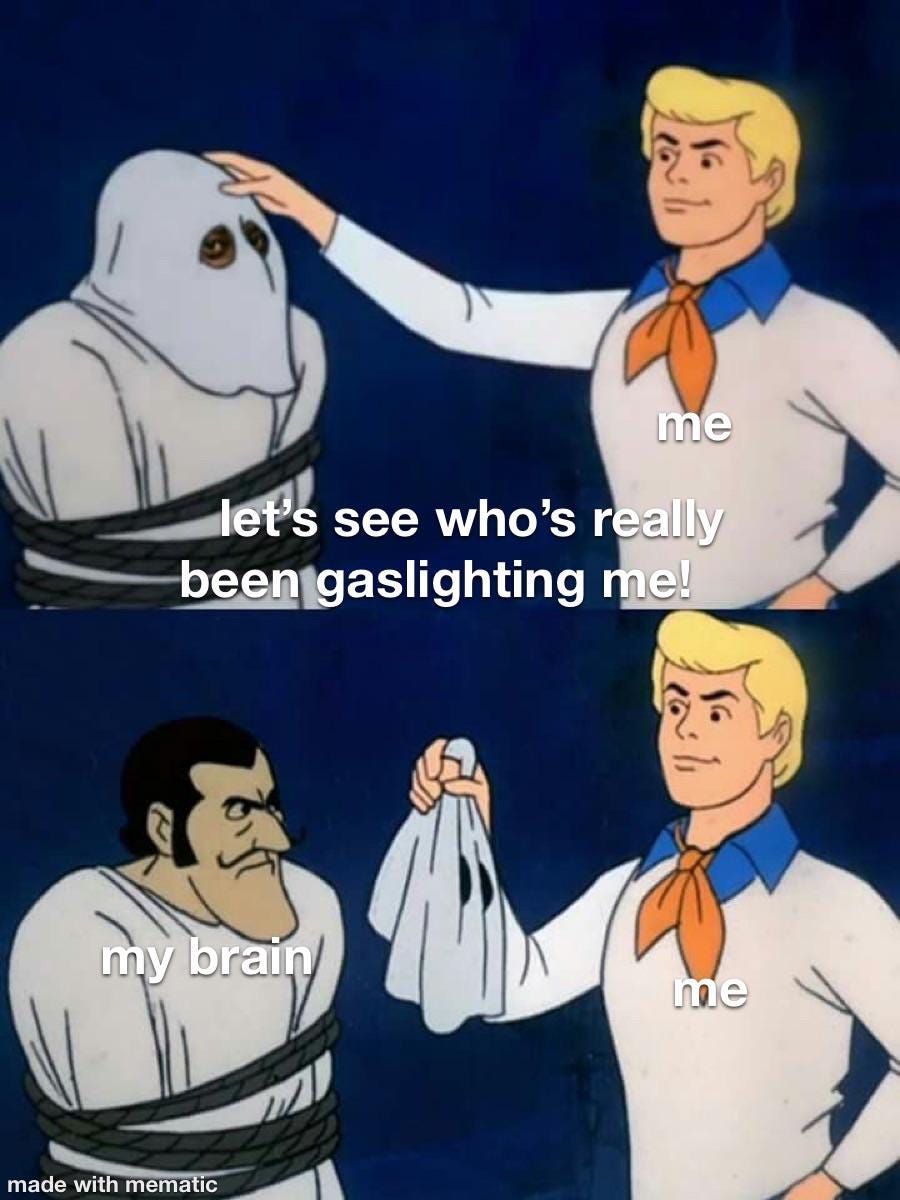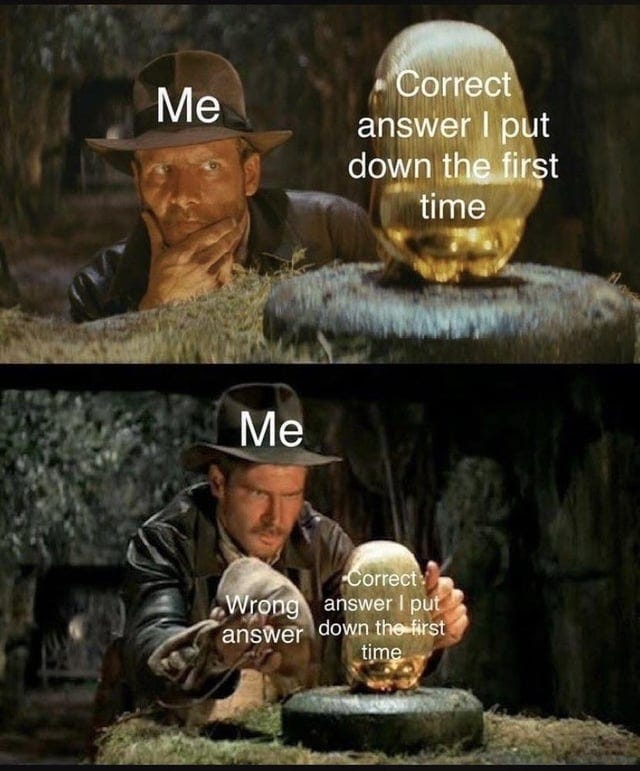Self correction vs second guessing
Overcomplicating already complex concepts
Welcome, aspiring polyglot! A major problem that many solo language learners run into is not knowing or not seeing the mistakes they are making. Whether those be mistakes in vocabulary, syntax, grammar structures generally, or something else. The difference between correcting yourself when you make a genuine error and second guessing yourself is slim, but the impact on your language acquisition is enormous.
Standing in your own way
It is one thing to know you have a problem, but it is entirely different seeing someone else face the same problem. I always thought that getting in my own way was a problem unique to me. Turns out it is nearly universal, at least within the realm of language acquisition. Every single student I have taught over the last ten years has one thing in common: They are their own biggest enemy.
Paralysis analysis is caused by fear of misunderstanding. At its core, this is a completely rational fear, but when you take a second to think about it, the fear breaks down quite quickly. Think to your daily life. How many times have you met someone whose first language is not English? How many mistakes did they make? Did you correct them? Did you stop talking to them because they didn’t speak perfect? People are kinder than you think.
Fear of mistakes and misunderstandings is one thing, but, funnily enough, it is only one piece of the equation. The other, possibly more damaging piece, is second guessing. There is a tremendous difference between correcting yourself and second guessing. While the latter will cause permanent damage to your confidence, the former is the penultimate step that comes before fluency.
In order to speak you need confidence and in order to build confidence you need to give yourself grace. You are, at the end of the day, doing something that is extremely difficult. So difficult that there are entire years of classes at elite universities around the world dedicated to teaching languages. Making mistakes along the way is part of the game and there is no way around it. Without grace, though, these mistakes quickly become a form of self-sabotage.
Self sabotage
Telling yourself you are always wrong is a problem. You are a very influential character in your life. By convincing yourself that you are always wrong by second guessing everything you say, you create a certain type of self fulfilling prophecy where you do end up being wrong more frequently. This, in turn, will be catastrophic for your confidence, particularly as you begin to use your new language more often. I would much rather you embody delusional confidence.
There will always be room for improvement. You have room to improve within your native language. Perfection is not the goal, conversation is the goal. Once you can hold a conversation with confidence, you can replicate it. As soon as you are able to speak confidently with people, all you have to do is continue speaking with people. If you ask, they will help you improve. If you do not ask, they will not tell you that you are making mistakes because they don’t want to deter you.
Now, for those who have built a habit of second guessing themselves, there is still time to break it. Unfortunately, it involves the most unpleasant feeling of all: allowing yourself to make mistakes. While counterintuitive, making mistakes will actually give you the opportunity to correct them which, in turn, will help prevent you from making them again in the future. Furthermore, when you allow yourself to make mistakes, you might just realize that you make fewer than you expect.
How writing can fix this problem
One of the main reasons people tend to fall into this second guessing trap is because the majority of the mistakes they make they make aloud. While it is a good thing to be unafraid of mistakes when you are speaking, it is equally important to write them down when you can. Unfortunately, most people never write anything down and, therefore, end up making the same mistakes over and over again which can be extremely frustrating.
Writing helps solidify things in your memory, yes, but more importantly it shows you where you are consistently making mistakes. At first this might sting, but once you realize that the only thing you needed to do to fix a mistake you are always making is understand why you were making that mistake, it get easier. Often, our repeat errors stem from our native language.
When you write sentences, you can easily tell whether or not that is the case. If it is, then it is an easy fix. If not, time to get back to the drawing board and see where else error might be happening. Seeing something happen consistently across topics is extremely difficult if you do not have a written log. It would be like trying to remember everything you say AND everything you intended to say in that moment. Something like that just isn’t feasible and the writing is the next best thing.
Take all of this a step further by writing in pen. It will force you to slow down, you will always see your mistakes, and when you write something, you wrote it for a reason. I had an English teacher in high school who made us do this. Freshman year was the last year I ever used a pencil. That woman changed my life and learning to write from her was probably the single greatest advantage I have had over the last decade. What seems insignificant at first quickly becomes your most powerful weapon.
Aside from making things permanent, writing in pen will give you the opportunity to actually self correct rather than second guessing. You can’t erase it. There is no going back. Only moving forward and continuously improving. When you get something wrong, put one line through it and write the correction above. That is self correction; and training yourself to do it on paper will make it easier to do mentally while you speak.
Conclusion
In most cases, people see themselves second guess on something obvious, like a multiple choice quiz. When you are speaking it far more difficult to recognize, but it is just as detrimental as second guessing on a test. Self correction, on the other hand, is the final step before fluency. It is crucial that you understand the difference between the two so that you can avoid the former and lean into the latter. Writing will make the distinction clear for you in ways that speaking cannot.
Remember, you will always be your own harshest critic. No one will ever remember how badly you messed up as vividly as you are going to remember it. Of course, if something is seared that deeply into your memory, it sure is hard to make the same mistake again. It will be difficult, but you can do difficult things and be great. So get out and do some difficult things and become great. I am rooting for you.
Requests
If you have anything you would like covered you can reach out to me on X, Instagram, or at odin@secondlanguagestrategies.com.
Additional Resources
Don't want to spend time playing catch up? Pick up the 3 Months to Conversational book now available on Amazon! 3 Months to Conversational
For more long form content be sure to check out the website and the FREE Language Learning PDFs we have available!
Subscribe for new content on YouTube and TikTok!
Learning Spanish? We have begun aggregating resources in you Spanish Resource Newsletter!
Don't forget to pick up your very own French Language Logbook or Spanish Language Logbook








This is so true and very helpful. Understanding more about how important writing is. Thank you!